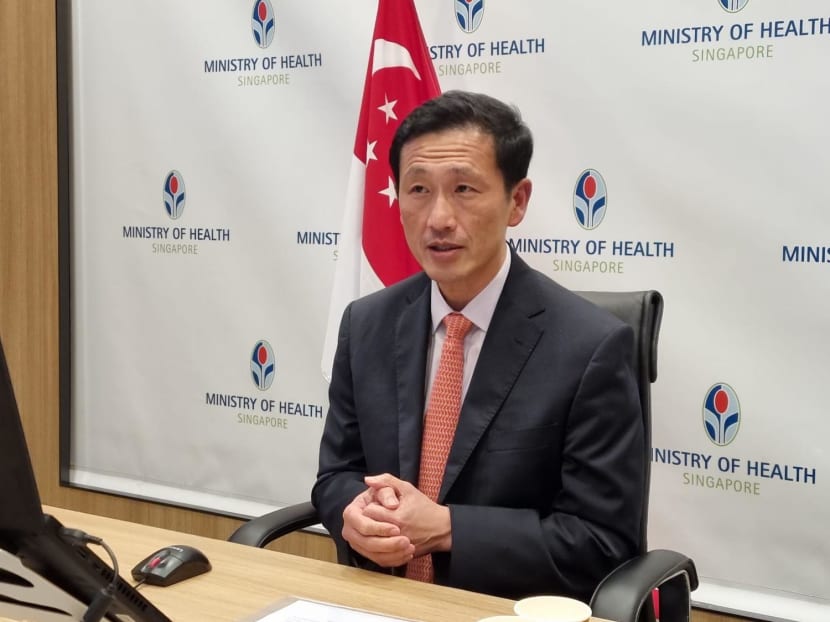COVID-19 fight a 'very difficult juggling act': Ong Ye Kung

Minister for Health Ong Ye Kung speaking at the Boao Forum for Asia Annual Conference Panel Session on Science-Based Approach in Fighting Against the Pandemic on Apr 21, 2022. (Photo: Ministry of Health)
SINGAPORE: The fight against COVID-19 is a "very difficult juggling act" which poses dilemmas such as striking the balance between lives and livelihoods, said Health Minister Ong Ye Kung on Thursday (Apr 21).
Singapore had to make many critical decisions while battling the pandemic, added Mr Ong, noting these included whether mask mandates were needed as well as requirements for vaccinations and boosters.
"Each of these decisions has to be guided by science and data," he said.
"And when the new data and findings become available and we discover that an earlier decision was inappropriate, we were prepared to change our positions and our policies, and explain the reasons to the public."
Tackling the pandemic also involves decisions that "go beyond science" - such as balancing health, economic and social considerations.
"This is a very difficult juggling act which all governments have to go through.
"And that is why there is a saying, 'lives versus livelihoods', which encapsulates the dilemmas that we all face," he said.
Mr Ong was speaking at the Boao Forum for Asia Annual Conference, at a panel session entitled Science-Based Approach in Fighting Against the Pandemic.
For many countries, the decision of “lives versus livelihoods” was taken out of their hands as their approach was more appropriate for diseases similar to influenza, he said.
"But COVID-19 is not influenza, it is far more deadly. As a result, the virus swept through their countries," said the Health Minister.
Immunity gained from both infection and vaccination has afforded the populations of these countries to acquire "strong herd protection", allowing them to live life more normally, said Mr Ong.
However, this "happy outcome" came only only after paying a huge price in human casualties, he warned.
Singapore's experience with severe acute respiratory syndrome (SARS) in 2003 meant the country had developed a set of measures that could contain the spread of COVID-19 when it arrived in the country in 2019, such as through contact tracing, border controls and curbing social activities.
"China’s effort to quickly map the genome of the virus and make it available to the world proved to be decisive and crucial for the rest of us, as it enabled the rapid development of test kits, which laid the foundation for our pandemic response," said Mr Ong.
This helped keep society relatively safe until vaccines became available and were administered to the large majority of Singapore's population, he said.
Mr Ong pointed to the "special effort" to reach out to seniors, as well as the implementation of vaccination-differentiated measures for public areas and travel.
This was aimed at reducing the risk of exposure for those not fully vaccinated and served as a "nudge" for people to get vaccinated, he said.
"When a large majority of our population has been vaccinated, we were then confident enough to shift our strategy from 'zero-COVID' to 'Living with COVID-19'," he said.
Singapore progressively reopened its economy, occasionally "stepping on the brakes" to protect the country's healthcare system and its people, he added.
CHANGE IN FOCUS
The biggest change in this process has been adjusting the mindset of society, rather than policy and health measures, said Mr Ong.
"From thinking that this is a deadly virus which we need to avoid at all cost, to being able to live with it as one of the many risks in lives, provided that we are well-vaccinated," he said.
He noted this has also involved a change in focus, from overall infection numbers to concentrating on severe cases leading to the intensive care unit or death.
"So the key area of focus is to ensure sufficient healthcare capacity to manage the severe cases," he said.
"Today, having gone through a major Omicron wave, our case numbers are relatively low, hospital operations are stable, borders are open, social and economic activities are almost back to normal," he said.
Singapore's accumulated incidence of fatalities due to COVID-19 is among the lowest in the world, he noted.
As of Thursday, Singapore has confirmed more than 1.1 million cases of COVID-19, with 1,322 deaths.
Mr Ong described Singapore's approach to the pandemic as one that best suited its needs and circumstances as "a globally connected city state which needs to tap into the world in order to survive".
"Other countries will have to tailor their pandemic responses based on their own unique circumstances, priorities, and societal cultures," he said.
"But ultimately, it is for each country to make the best choice for its people based on the available information as well as a combination of natural and social sciences."
BOOKMARK THIS: Our comprehensive coverage of the COVID-19 pandemic and its developments
Download our app or subscribe to our Telegram channel for the latest updates on the coronavirus pandemic: https://cna.asia/telegram









